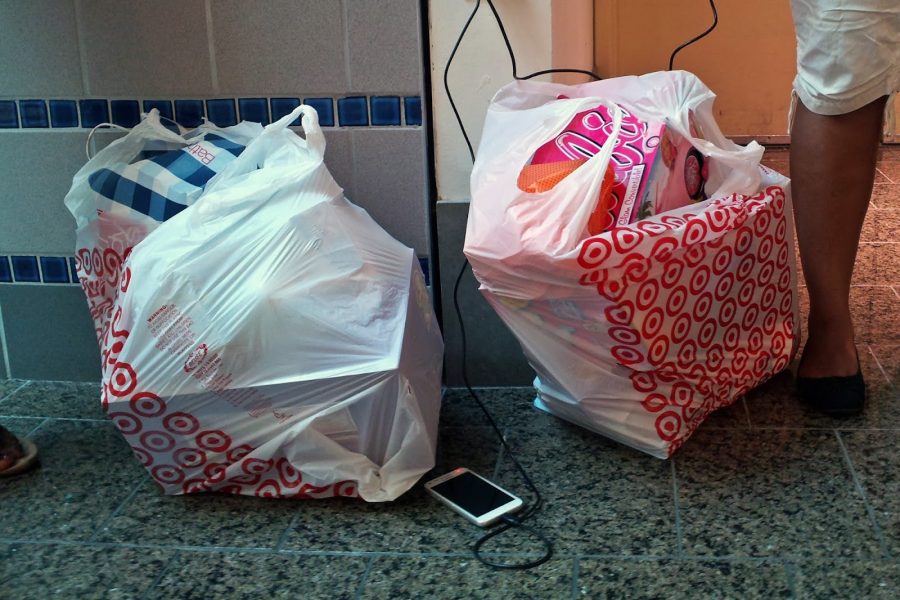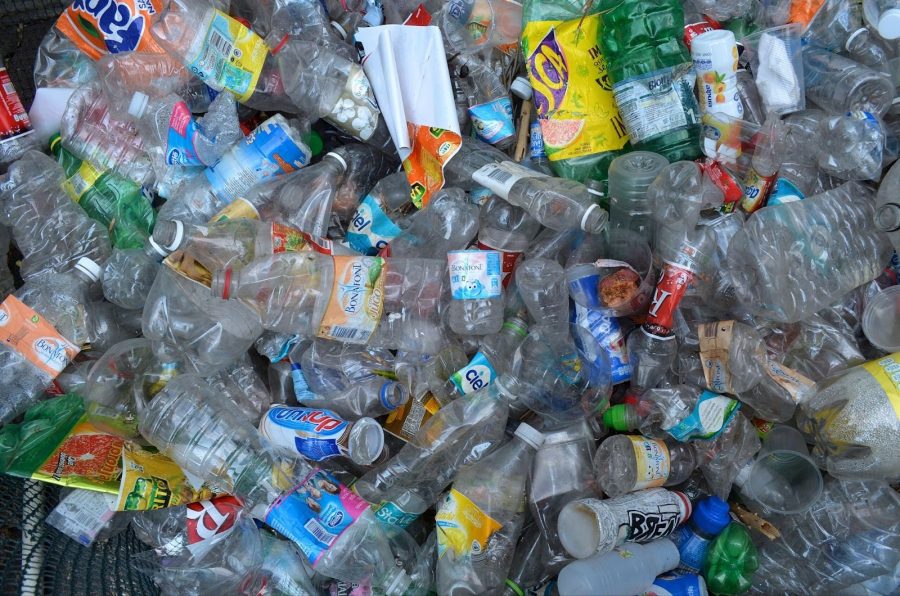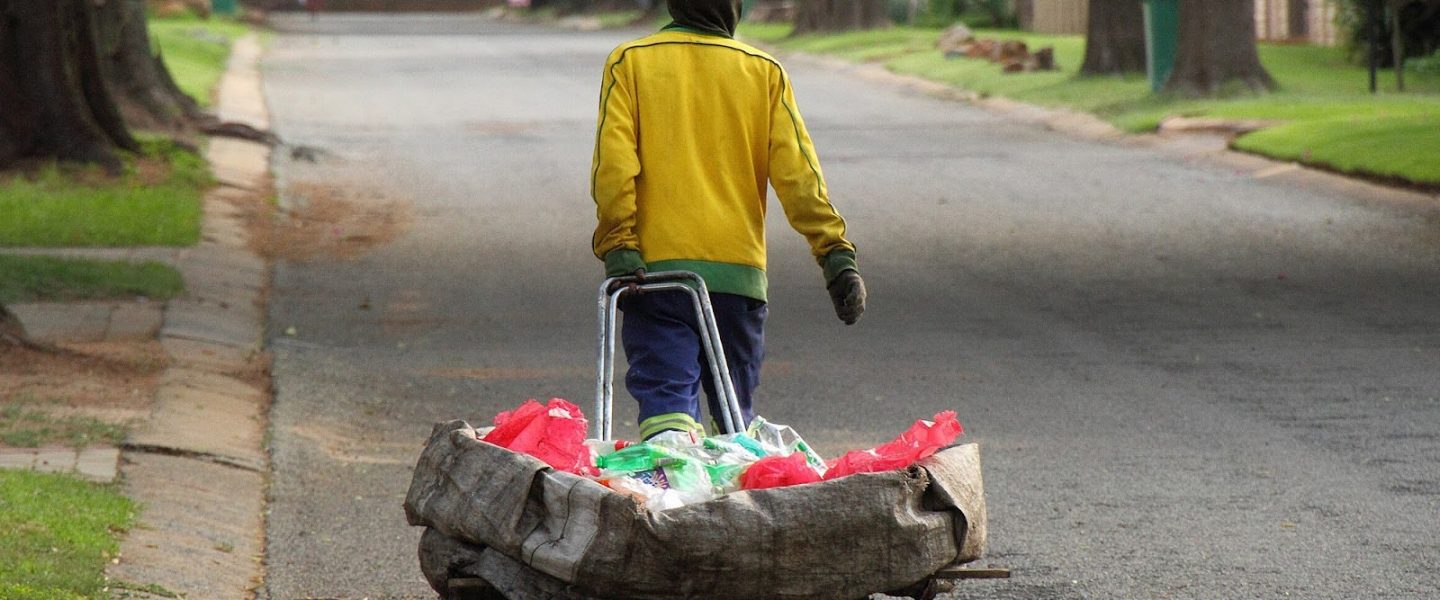New documents show how they promoted it anyway.
|
Listen To This Story
|
This story by Joseph Winters was originally published by Grist and is part of Covering Climate Now, a global journalism collaboration strengthening coverage of the climate story.
•
For 40 years, plastic and petrochemical companies have tried to convince the public that plastics can be recycled. But they’ve known for just as long that plastics recycling would never work.
A report released last week by the nonprofit Center for Climate Integrity, or CCI, chronicles a “decades-long campaign of fraud and deception” from Big Oil and the plastics industry to promote recycling as a solution to the plastic pollution crisis. New documents show that industry executives pushed plastics recycling despite knowing since the 1980s that it “cannot be considered a permanent solid waste solution,” and that recycled plastics would never be able to compete economically with virgin material.
Today, the US recycling rate for plastics sits at about 5 or 6 percent. It has never risen above 10 percent.
The report’s authors liken the plastics industry’s recycling campaign to Big Oil’s tactics to convince the public that its products don’t cause climate change. Many companies have been involved in both efforts, since plastics are made from fossil fuels. “The oil industry’s lies are at the heart of the two most catastrophic pollution crises in human history,” Richard Wiles, CCI’s president, said in a statement.
CCI traces industry support for plastics recycling back to the 1980s, when it was proposed as a response to widespread public concern over the material’s proliferation — especially as litter. With the threat of regulation looming large, industry representatives felt they had little choice but “to recycle or be banned.”
Even then, the industry acknowledged major and potentially insurmountable hurdles to plastics recycling. Most significantly, there was no market for recycled plastic — it was too expensive and low-quality to compete with virgin material. One document uncovered by CCI — a 1986 report from the plastics industry trade group the Vinyl Institute — noted that “purity and quality demands set for many applications preclude the use of recycled material.” In the end, the report concluded that recycling “merely prolongs the time until an item is disposed of.”
Plastics and petrochemical company representatives repeatedly shared similar concerns at industry conferences, in meeting notes, and elsewhere: that plastics recycling consumed too much energy, that it would only work for a small fraction of plastic waste, and that a quickly growing supply of virgin materials would “kick the s–t out of” recycled plastic prices, as one official of the now-defunct American Plastics Council wrote in meeting notes obtained by CCI.
Davis Allen, an investigative researcher for CCI and the lead author of the report, said many of the new documents came from a former American Plastics Council staffer. Others came from industry document databases maintained by Columbia University, New York University, and the University of California, San Francisco.

Photo credit: Ben Schumin / Flickr (CC BY-SA 2.0 DEED)
The documents, Allen said, strongly suggest that the plastics and petrochemical industries saw recycling as little more than a way to tame public outrage and ward off anti-plastic legislation. One 1994 document quotes a representative of Eastman Chemical saying that, while plastics recycling might one day become a reality, “it is more likely that we will wake up and realize that we are not going to recycle our way out of the solid waste issue.” Another document — handwritten notes from a meeting between Exxon Chemical and the American Plastics Council — quotes Exxon Chemical’s then-vice president saying that, when it came to recycling plastics, “we are committed to the activities, but not committed to the results.”
Still, trade groups and large petrochemical companies invested heavily in public relations to improve plastics recycling’s image. They touted ambitious goals to increase the recycling rate, and then remained quiet when they failed to meet them, or changed the way they measured their progress. Advertisements “simply repeated the same lies about the viability of plastic recycling,” according to CCI. For example, one 1991 ad in Ladies’ Home Journal claimed that “a bottle can come back as a bottle, over and over again.” Meanwhile, educational materials created for use in schools implied that recycling could assuage students’ guilt over using disposable plastic foodware.
By the mid-1990s, the results seemed to have paid off. Industry polling showed that public opinion on plastics had greatly improved and state-level efforts to ban or restrict plastic production had waned considerably — even though the dismal state of plastics recycling had not significantly improved.
Today, most plastic waste gets incinerated or sent to landfills, where it creates hazardous air and water pollution that disproportionately affects low-income communities and communities of color. Meanwhile, environmental advocates say the “myth” of plastics recycling has facilitated the industry’s unmitigated expansion — plastic production has grown by nearly 230 times since 1950. Plastics are expected to drive nearly half of the growth in global oil demand between 2017 and 2050.
CCI isn’t the first group to document the plastics industry’s deceptive communication practices around recycling. A 2020 investigation from NPR and Frontline found ample evidence that the plastics industry and its trade groups promoted plastics recycling despite knowing it was “costly” and “infeasible.” Two former industry executives told the outlets that recycling was used to “advertise our way out of” negative PR.

Photo credit: Celinebj / Wikimedia (CC BY-SA 4.0 DEED)
Since the mid-2010s, a second wave of anti-plastic outrage has spurred the plastics industry and its lobbying groups to again promote the promise of plastics recycling — only this time, they’re pushing so-called “chemical recycling,” which can supposedly melt plastic into its constituent polymers so it can be turned back into new products. Although chemical recycling technologies have existed for decades, most existing facilities — and there are only a few — are still unable to create new plastic products; they mostly turn plastic into chemicals or fossil fuels to be burned.
Lew Freeman, the Society of the Plastics Industry’s former vice president of government affairs, told Grist in an interview last year that there are “serious questions” about the degree to which chemical recycling can ever work. “The industry seems to be doing the same thing it did 30-some-odd years ago,” Freeman said.
Ross Eisenberg, president of America’s Plastic Makers — a subgroup of the petrochemical industry trade organization the American Chemistry Council, which absorbed the American Plastics Council in 2002 — criticized the CCI report as “flawed.” In a statement, he said it “works against our goals to be more sustainable by mischaracterizing the industry and the state of today’s recycling technologies.” Eisenberg did not specifically refute any of the claims made by CCI.
In response to Grist’s request for comment, the Vinyl Institute did not address any of the report’s claims but said it was “committed to increasing” the amount of polyvinyl chloride — a kind of plastic — that gets recycled each year. Eastman Chemical and ExxonMobil did not respond to Grist’s requests for comment in time for publication.
CCI hopes that its report “lays the foundation” for more ambitious legal challenges against the plastics and petrochemical industries. According to Alyssa Johl, CCI’s vice president of legal and general counsel, most lawsuits so far have targeted the makers of specific products — for instance, Keurig, which misleadingly placed the “chasing arrows” recycling symbol on coffee pods that couldn’t actually be recycled.
These lawsuits “don’t go far enough,” Johl said. In her view, future cases should target the whole industry — including the fossil fuel producers themselves and their trade organizations, highlighting the integral role they played in promoting recycling as a solution to the plastic pollution crisis. Such lawsuits are mostly likely to be brought by cities or state attorneys general, Johl said, and they may invoke public nuisance, consumer fraud, racketeering, or conspiracy laws — similar to successful legal challenges that have been brought against the tobacco and opioid industries.
The most promising push so far has come from California Attorney General Rob Bonta, who in 2022 began investigating fossil fuel and chemical companies for their role in what he called an “aggressive campaign to deceive the public” about the viability of plastics recycling. That investigation is ongoing.





